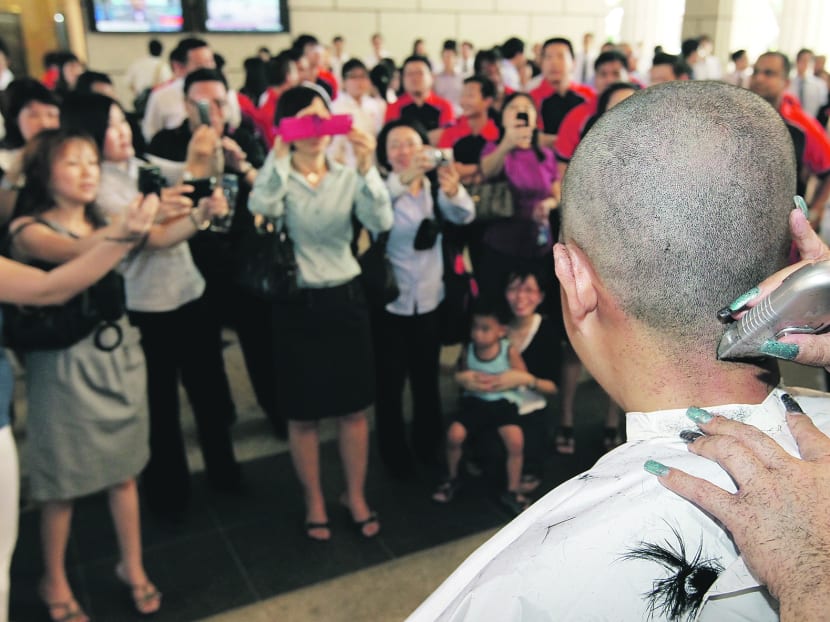Case-by-case approach for pupils who want to support causes: Schools
SINGAPORE — On the first day of school after they shaved their heads for charity, three Crescent Girls’ School students addressed the school about why they went bald for the Hair for Hope fund-raising event last weekend.
SINGAPORE — On the first day of school after they shaved their heads for charity, three Crescent Girls’ School students addressed the school about why they went bald for the Hair for Hope fund-raising event last weekend.
The girls, who spoke as part of a group of students involved in community projects, stressed that their actions were “not just a frivolous act”, but rather consistent with the school’s mission to be responsible members of society, according to school principal Tan Chen Kee. The school had met the girls before they participated in the event and made sure that permission from their parents was sought.
How schools balance students’ aspirations in advocating their chosen causes, while maintaining their bearing, came under the spotlight recently after three girls in St Margaret’s Secondary School drew the ire of their principal for refusing to wear wigs in class after shaving their heads in the Hair for Hope event, even though they had promised to do so.
The school felt the girls had to uphold their promise and wanted to ensure that others do not take advantage of the situation, The Straits Times reported yesterday.
In a statement last night, St Margaret’s principal Marion Tan said the school “has always been supportive of our students participating in charitable causes”.
“To this end, the school was supportive of our students’ decision to shave their heads to show support to Hair for Hope. The school had given the students the option of not wearing the wigs if they have an allergy to them. The school will look into its processes to better facilitate its support of future causes for charity,” she said.
Other educators interviewed said they would take a case-by-case approach and assess students’ rationale for advocating certain causes. Apart from informing the school prior to the event, other guiding principles include whether students’ initiatives align with national campaigns and were carried out during the campaign period.
For instance, Pioneer Junior College (PJC) principal Tan-Kek Lee Yong said there would be no issues if, for example, students donned campaign pins during breast cancer awareness week.
Last year, five PJC boys shaved their heads for the Hair for Hope event without informing the school. After speaking to them, the school managed to ascertain their commitment to the campaign.
As for self-initiated advocacy efforts where students make their own badges, Mrs Tan-Kek said students would have to let their teachers know in advance.
“It’s always hard to find a balance as the students are passionate and we don’t want to stifle them ... but we also don’t want other students to misinterpret the intentions behind that,” she said.
Mrs Tan, Crescent Girls’ School principal, added: “As a school, we want to support good causes and there is no blanket rule. But, as shaving their heads would impact their appearance, the students ought to seek permission.”
Hwa Chong Institution principal Hon Chiew Weng said that although he did not feel shaving was the best way to show support for cancer patients, he did not stop his students.
“I want to give them the space to learn to make their own decisions,” he said. As long as pupils are not doing things that are “unethical or socially unacceptable”, Dr Hon said he would not interfere.
However, he agreed that it is “difficult to draw the line” on some occasions, and would prefer to reach a common understanding with pupils if they want to do something that might be undesirable.
The Children’s Cancer Foundation, which organised the Hair for Hope event, said yesterday that participants below the age of 18 were advised to seek parents’ approval before taking part. Of the 16 schools which took part, 12 had female students shaving for the cause.
Parent Joseph Seah felt that St Margaret’s had the right to ensure pupils honour the promises made. “If we allow our children to break promises that they agreed, they will no longer take it seriously in future,” he said.
Former principal Belinda Charles said school leaders face the dilemma of striking a balance between acceding to students’ requests and ensuring the school’s overall beliefs are not compromised.
Said Mrs Charles: “Principals have to think how to help students do things that are meaningful, but yet they are running a school — that is not just a family of three children, but over a thousand pupils.”
But potential misunderstandings could be avoided by using these opportunities as “teachable moments” and getting students to explain their interests to their peers, she added.







